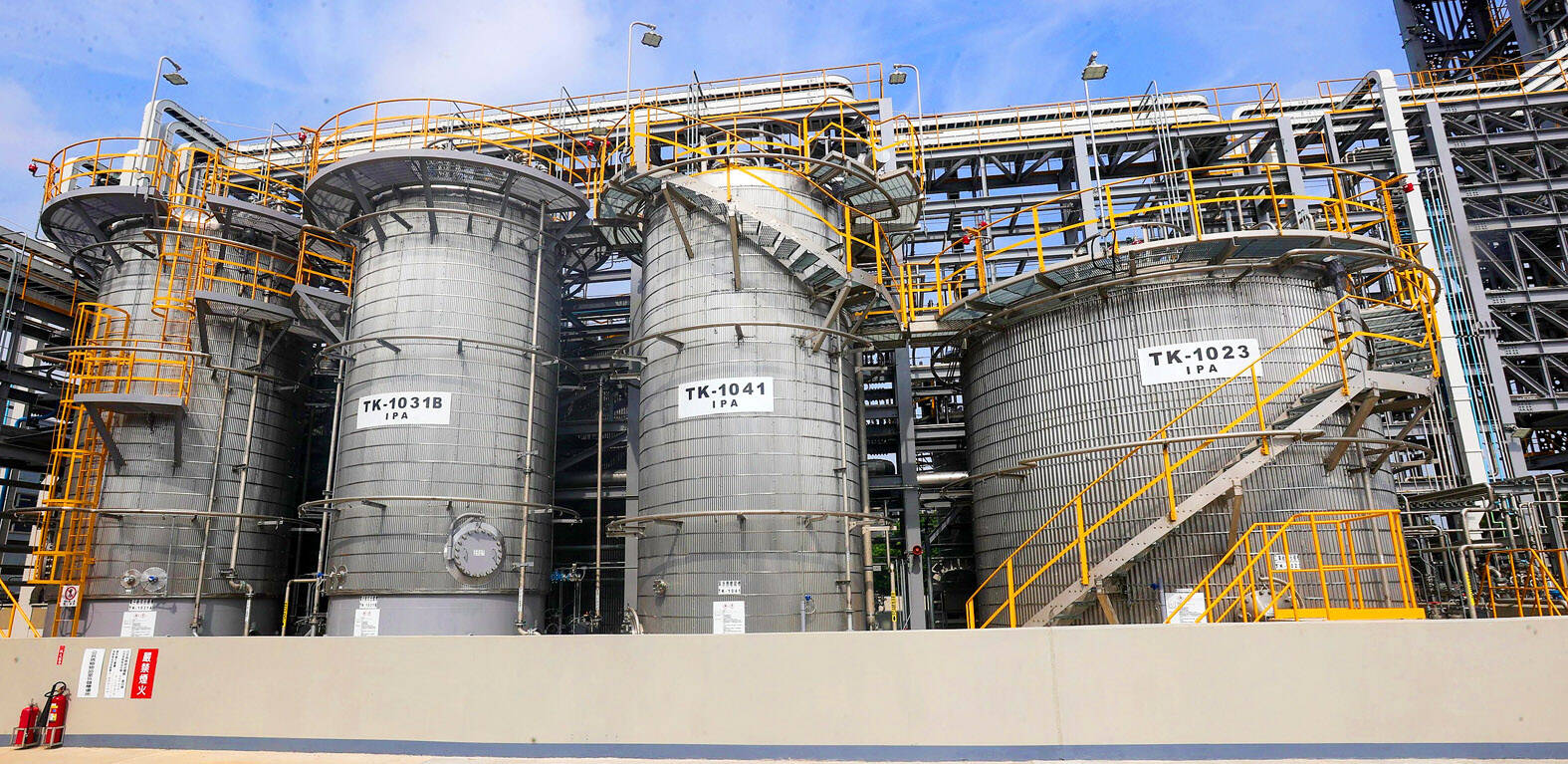Taiwan Semiconductor Manufacturing Co (TSMC, 台積電), the world’s biggest contract chipmaker, yesterday launched its first zero-waste center in Taichung to repurpose major manufacturing waste, which translates into savings of NT$1.5 billion (US$46 million) in environmental costs a year.
The environmental cost savings include a carbon reduction benefit of 40,000 tonnes, equivalent to the carbon offset of over 110 Daan Forest Parks, the chipmaker said.
The Taichung Zero Waste Manufacturing Center is part of the chipmaker’s greater efforts to reach its net zero emissions goal in 2050, aligning with the UN’s 12th Sustainable Development Goal.

Photo: Liao Yao-tung, Taipei Times
The center could reduce TSMC’s outsourced waste processing by 130,000 tonnes each year, accounting for more than 85 percent of the total waste from TSMC’s facilities in the Central Taiwan Science Park, TSMC cochief operating officer Y.P. Chyn (秦永沛) said at the launch ceremony in Taichung yesterday.
“As a global leader in semiconductor manufacturing, we recognize our mission in environmental protection and resource management. Through the Taichung Zero Waste Manufacturing Center, we aim to inspire industries to prioritize and invest in the circular economy, accelerating development momentum to create a better planet for future generations,” Chyn said.
The company plans to create more zero-waste centers at other domestic and international locations, Chyn said.
The center features four major recycling facilities that include fluoride recycling, silica recycling, solvent thermal recovery and isopropanol recovery. TSMC operates the center together with its supply chain partners Chang Chun Petrochemical Co (長春石化), Transcene Corp (成信實業) and Li Ying Environmental Technology Co (立盈環保科技).
Since beginning trial operations last year, the center has purified and recycled chemicals to meet the standards for recycled products. These chemicals are suitable for use in other industries such as steel industry and are being developed into electronic-grade quality for reuse in semiconductor processes, reducing the need for raw material extraction and pioneering a new model of the circular economy, TSMC said.
The zero-waste center has emerged as Taiwan’s pioneering demonstration site for implementing membrane carbon capture technology, it said.
TSMC and the Ministry of Environment yesterday signed a memorandum of understanding to jointly develop this technology, which would be introduced into general waste thermal treatment (incineration) facilities.

MULTIFACETED: A task force has analyzed possible scenarios and created responses to assist domestic industries in dealing with US tariffs, the economics minister said The Executive Yuan is tomorrow to announce countermeasures to US President Donald Trump’s planned reciprocal tariffs, although the details of the plan would not be made public until Monday next week, Minister of Economic Affairs J.W. Kuo (郭智輝) said yesterday. The Cabinet established an economic and trade task force in November last year to deal with US trade and tariff related issues, Kuo told reporters outside the legislature in Taipei. The task force has been analyzing and evaluating all kinds of scenarios to identify suitable responses and determine how best to assist domestic industries in managing the effects of Trump’s tariffs, he

TIGHT-LIPPED: UMC said it had no merger plans at the moment, after Nikkei Asia reported that the firm and GlobalFoundries were considering restarting merger talks United Microelectronics Corp (UMC, 聯電), the world’s No. 4 contract chipmaker, yesterday launched a new US$5 billion 12-inch chip factory in Singapore as part of its latest effort to diversify its manufacturing footprint amid growing geopolitical risks. The new factory, adjacent to UMC’s existing Singapore fab in the Pasir Res Wafer Fab Park, is scheduled to enter volume production next year, utilizing mature 22-nanometer and 28-nanometer process technologies, UMC said in a statement. The company plans to invest US$5 billion during the first phase of the new fab, which would have an installed capacity of 30,000 12-inch wafers per month, it said. The

Taiwan’s official purchasing managers’ index (PMI) last month rose 0.2 percentage points to 54.2, in a second consecutive month of expansion, thanks to front-loading demand intended to avoid potential US tariff hikes, the Chung-Hua Institution for Economic Research (CIER, 中華經濟研究院) said yesterday. While short-term demand appeared robust, uncertainties rose due to US President Donald Trump’s unpredictable trade policy, CIER president Lien Hsien-ming (連賢明) told a news conference in Taipei. Taiwan’s economy this year would be characterized by high-level fluctuations and the volatility would be wilder than most expect, Lien said Demand for electronics, particularly semiconductors, continues to benefit from US technology giants’ effort

‘SWASTICAR’: Tesla CEO Elon Musk’s close association with Donald Trump has prompted opponents to brand him a ‘Nazi’ and resulted in a dramatic drop in sales Demonstrators descended on Tesla Inc dealerships across the US, and in Europe and Canada on Saturday to protest company chief Elon Musk, who has amassed extraordinary power as a top adviser to US President Donald Trump. Waving signs with messages such as “Musk is stealing our money” and “Reclaim our country,” the protests largely took place peacefully following fiery episodes of vandalism on Tesla vehicles, dealerships and other facilities in recent weeks that US officials have denounced as terrorism. Hundreds rallied on Saturday outside the Tesla dealership in Manhattan. Some blasted Musk, the world’s richest man, while others demanded the shuttering of his